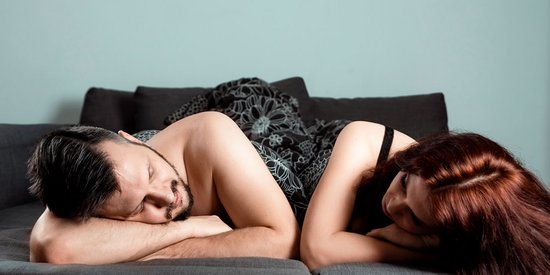There are many reasons why some women have sex, even when they don't feel like it, and the consequences can be good or bad, depending on why they do it.
With time, will everything go away?
Sexual desire often drops off after marriage and especially for the women whose sexuality gets disturbed after the arrival of a baby. There are also those women who say: “I love him but I don’t feel like making love any more.” The longer you wait before engaging in sex, the harder it will be to start again.
Do all couples face this at one time or another?
The desire to satisfy a partner or the feeling of obligation is often the most common motivation for having sex without feeling like it. People may also seek to alleviate feelings of guilt, shame, feeling indebted, or sometimes for certain women, their culture suggests that it is “their duty as women” to have sex, even if they are not in the mood.
Far from being an unhealthy opinion, it is very obvious that the act of making love remains based on reciprocity, however some exceptions do exist for certain couples.
Charlotte tells us about her experience: Charlotte, 39 who describes her sex life as honest, unorthodox, adventurous and fluid. “I've been in a relationship for three years and even if I don't feel like having sex every day, I like the idea of giving pleasure to my partner. There is never a day when I cannot enjoy intimacy with him, and through this, I easily surrender myself to him with a surge of pleasure. It must be said though, that my partner knows how to give me pleasure: so it is the pleasure of giving and receiving..."
What Charlotte is experiencing is an example of a positive outcome of having sex without having any particular desire first. The bodily organs only work if we look after them!
So, should we stop at the simple fact that we don’t feel like it, to or give in, like Charlotte, and let shared desire rise up and take over?
When the answer is NO!
On the other hand, the reasons are unfavourable when there is a negative impact on our mental health and well-being.
We will not go into the explanation of sexual anorexia, however for many women, a much deeper malaise is at the root of the problem.
When a decline in desire happens in a relationship, it is above all necessary to understand the mechanisms on how this came about and what the causes are.
If you have sex when you don't want to, your body is more likely to be tense, and this can lead to sexual pain.
You may also begin to feel resentful towards your partner and find that you are still frustrated and angry, and slowly but surely, this can subconsciously lead you to avoid any kind of physical and emotional intimacy. No longer finding sex pleasurable or satisfying, having the impression that sex is always a duty or a chore, in the long term this could have negative impacts on your relationship, and even on your mental health.
In the following testimony, Emma says that having sex with her husband when she doesn't feel like it, makes her even less eager to have sex at other times. "I never dared to tell him, but sometimes I just accept having sex with him. When I don't feel like it, I regularly fake an orgasm to make it go faster," the young woman tells us. No longer desiring the other person does not mean no longer loving them, emphasizes Emma. “Unfortunately for me, sex has just become a chore or a duty rather than a warm and desirable feeling of connection and intimacy, which just widens the gap between us even further. Sometimes I even have a feeling of disgust towards myself, and I feel more and more hurt.”
Anyway, we can never repeat it enough, but once again communication is essential. At first, you can reassure your partner and take the time to help and accompany him tenderly, to regain a fulfilling sex life. If the problem persists, you can always call a professional who will help you.
Anaphrodisia, sexual anorexia or loss of libido is a disorder that mainly affects women. Should we accept sex when we do not feel like it? The answer, whatever the experiences cited above, remains a definitive NO.
You can also evaluate sexual desire disorders (SDD) with the help of an external professional such as a sexologist, or you can also let yourself be carried away by the American current with support groups such as the DASA or CODA.









